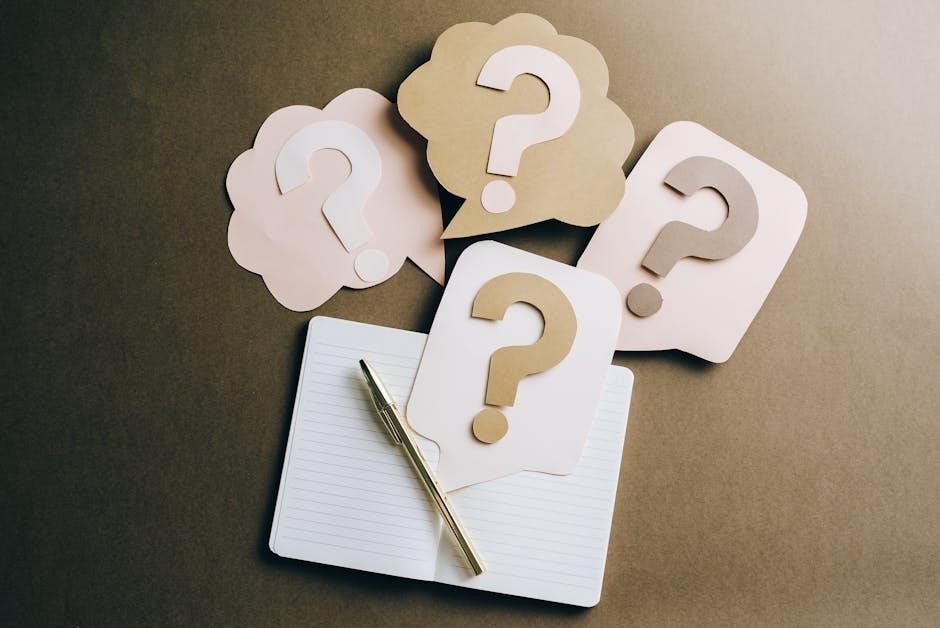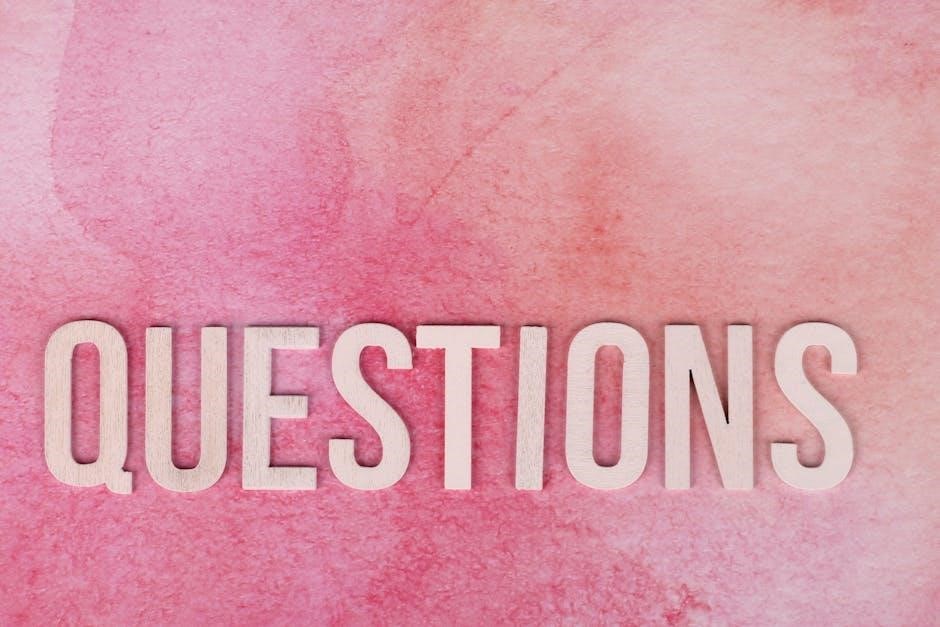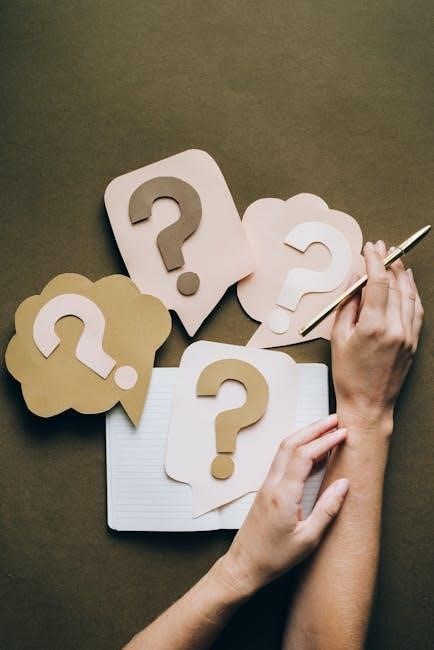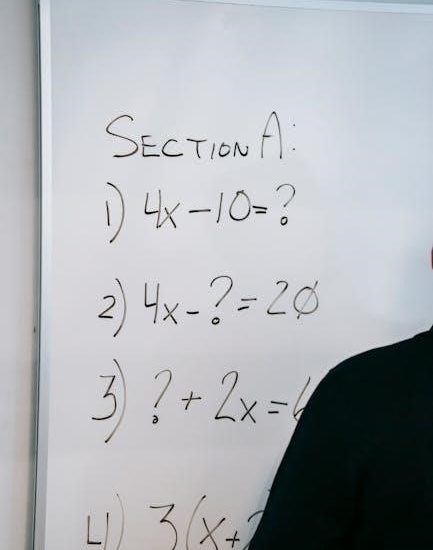WH questions are essential for seeking specific information in English. They use question words like who‚ what‚ when‚ where‚ why‚ and how. These questions help clarify details in conversations and are widely used in both spoken and written English. Understanding their structure and usage is crucial for effective communication.
Definition and Importance of WH Questions
WH questions‚ also known as open questions‚ are inquiries that begin with question words like who‚ what‚ when‚ where‚ why‚ and how. They are essential for seeking detailed information and clarifying specific points in conversations. Unlike yes/no questions‚ WH questions encourage comprehensive responses‚ making them vital for effective communication. Mastering WH questions is fundamental for learners of English‚ as they enhance both spoken and written interactions. Worksheets and resources are widely available to practice forming and answering these questions accurately.
Common WH Words in English
The most frequently used WH words in English are who‚ what‚ when‚ where‚ why‚ and how. These words are essential for forming questions that seek specific information. For example‚ “Who are you?” asks for identity‚ while “What are you doing?” inquires about actions. “When” pertains to time‚ “where” to location‚ “why” to reasons‚ and “how” to methods or conditions. These words help structure clear and precise questions‚ making communication more effective. They are widely practiced in worksheets and exercises to ensure proper usage.

Types of WH Questions
WH questions vary based on the information sought. They include who‚ what‚ when‚ where‚ why‚ and how questions. Each type targets specific details‚ aiding clear communication.
Who Questions
Who questions are used to ask about the identity or role of a person or people involved in a situation. For example‚ “Who is coming to the party?” or “Who wrote this book?” These questions help identify individuals or groups‚ making them essential in conversations where personal details are needed. They are straightforward and commonly used in both formal and informal settings to gather specific information about someone.
What Questions
What questions are used to inquire about objects‚ ideas‚ or information. They often seek details about things‚ events‚ or explanations. For instance‚ “What is your favorite color?” or “What time does the movie start?” These questions are versatile and help gather specific details about something. They are commonly used in both spoken and written English to clarify information‚ making them an essential part of effective communication in various contexts.
When Questions
When questions are used to ask about time or frequency. They help determine specific points in time‚ such as “When do you usually have breakfast?” or “When will the meeting start?” These questions are essential for organizing schedules and understanding timelines. They are commonly used in both spoken and written English to clarify timing details‚ making them a fundamental part of effective communication in various contexts.
Where Questions
Where questions are used to ask about locations or directions. They help identify specific places or positions‚ such as “Where do you live?” or “Where is the park?” These questions are straightforward and commonly used in everyday conversations to seek clarity about locations. They are an essential part of learning English‚ as they enable effective communication in various situations‚ from giving directions to discussing travel plans.
Why Questions
Why questions are used to understand reasons or explanations. They help uncover the cause behind an action or event‚ such as “Why is the sky blue?” or “Why are you late?” These questions are essential for critical thinking and problem-solving. They encourage deeper conversations and are commonly used in both personal and professional settings to seek clarity and understanding. Mastering why questions enhances communication skills and fosters meaningful discussions.
How Questions
How questions inquire about methods‚ conditions‚ or degrees‚ such as “How do you make pasta?” or “How are you feeling?” They seek detailed explanations or instructions. These questions are crucial for understanding processes‚ emotions‚ or states. For example‚ “How did you solve the problem?” or “How can I improve my English?” Practicing how questions enhances communication by gathering specific‚ actionable information. Worksheets and exercises often include examples like “How often do you exercise?” to help learners master their use in everyday conversations.
WH Questions in Different Tenses
WH questions can be formed in various tenses‚ such as present simple‚ present continuous‚ past simple‚ and future simple. For example‚ “When are you traveling?” (present continuous) or “Where did you go?” (past simple). These questions help specify time frames and actions‚ making conversations more precise. Worksheets often include exercises like “What were you doing?” to practice tense usage effectively.
Present Simple WH Questions
Present simple WH questions are used to ask about routines‚ facts‚ or general truths. They often begin with what‚ where‚ when‚ why‚ who‚ or how. For example‚ “What do you eat for breakfast?” or “Where do you live?” These questions are formed by placing the WH word at the beginning‚ followed by the auxiliary verb (do/does)‚ the subject‚ and the main verb. Worksheets and exercises‚ such as those found online‚ provide practice in forming and answering these questions correctly. They are ideal for beginners learning basic sentence structures and question formation.
Present Continuous WH Questions
Present continuous WH questions focus on actions happening at the moment of speaking. They begin with WH words like what‚ where‚ or who‚ followed by am/is/are. For example‚ “What are you doing?” or “Where are they going?” These questions are structured with the WH word‚ the auxiliary verb (am/is/are)‚ the subject‚ and the present participle verb. Worksheets and exercises‚ such as those found in free PDF resources‚ provide ample practice for learners to master this structure; They are ideal for improving grammar and conversation skills in English.
Past Simple WH Questions
Past simple WH questions inquire about completed actions in the past. They use WH words like who‚ what‚ when‚ where‚ why‚ or how. For example‚ “Who did you meet yesterday?” or “What happened last weekend?” These questions follow the structure: WH word + subject + past simple verb. Worksheets often include exercises like filling in the correct WH word or forming full questions. Resources like free PDF grammar sheets provide practice for mastering past simple WH questions‚ enhancing both writing and speaking skills in English.
Future Simple WH Questions
Future simple WH questions ask about future actions or plans. They use WH words like who‚ what‚ when‚ where‚ why‚ or how. For example‚ “Who will attend the meeting?” or “What will you do tomorrow?” These questions follow the structure: WH word + subject + will + base verb. Worksheets and PDF resources provide exercises to practice forming and answering future simple WH questions‚ helping learners master this tense in both spoken and written English effectively.

Forming WH Questions
WH questions begin with a WH word (who‚ what‚ when‚ etc.)‚ followed by the subject and verb. For example‚ “Who is coming?” or “What do you need?” Practice with exercises from PDF resources helps master their structure and usage effectively.
Structure of WH Questions
WH questions follow a specific structure: they begin with a WH word (who‚ what‚ when‚ where‚ why‚ how)‚ followed by the subject and the verb. For example‚ “Who is coming?” or “What are you doing?” The WH word serves as the question word‚ and the rest of the sentence provides context. This structure helps in forming clear and grammatically correct questions. PDF resources offer numerous exercises to practice this structure‚ ensuring mastery over WH question formation.
Forming Questions with Be
WH questions using “be” follow a simple structure: WH word + be (am/is/are/was/were) + subject. For example‚ “Who is coming?” or “What is happening?” The verb “be” must agree with the subject in number and tense. In negative questions‚ “not” is added after “be‚” as in “Who isn’t attending?” Practice exercises in PDFs provide drills to master this structure‚ enhancing fluency in forming correct questions with “be.”
Forming Questions with Have/Has
WH questions using “have” or “has” follow the structure: WH word + have/has + subject + past participle. For example‚ “What do you have?” or “What does she have?” In past tense‚ it becomes “What did you have?” or “What did she have?” The auxiliary verb “have” or “has” must agree with the subject in number and tense. Practice worksheets provide exercises like “What has he done?” or “What do they have?” to master this structure effectively.
Forming Questions with Do/Does
WH questions using “do” or “does” follow the structure: WH word + do/does + subject + base verb. For example‚ “What do you eat?” or “Where does she live?” The auxiliary verb “do” or “does” must agree with the subject in number. In negative questions‚ “don’t” or “doesn’t” is used‚ like “What don’t you like?” Practice worksheets provide exercises such as “Who does the homework?” or “Where do they study?” to help master this structure effectively.

Practicing WH Questions
Practice WH questions with exercises like gap-fill‚ writing questions‚ and speaking activities. These exercises help learners master question formation and improve their English communication skills effectively.
Exercises for Beginners
Beginners can start with simple gap-fill exercises‚ where they insert correct WH words (who‚ what‚ when‚ where‚ why‚ how) into sentences. For example:
- ______ is your favorite color? (Who/What)
- ______ do you study English? (When/Why)
- ______ is that book? (Who/What)
These exercises help learners understand question formation and improve their grammar skills. Worksheets with answers are available online‚ making practice easy and effective for building confidence in using WH questions.
Advanced WH Question Practice
Advanced learners can refine their skills with complex WH questions‚ such as transforming sentences into questions or creating conversations. Activities include:
- Writing WH questions from prompts (e.g.‚ “She/like/cooking” → “What does she like?”).
- Creating dialogues using multiple WH words (e.g.‚ “Who‚” “What‚” “Why”).
- Practicing tenses in questions (e.g.‚ “When did you finish?”).
These exercises enhance fluency and accuracy‚ preparing learners for real-life conversations and complex discussions.
Speaking Activities for WH Questions
Speaking activities enhance fluency and confidence in using WH questions. Pair work and role-plays encourage learners to ask and answer questions spontaneously. For example‚ one student asks‚ “What’s your favorite hobby?” and the other responds. Group discussions on topics like “What do you like about holidays?” promote natural conversation. Interactive games like “Find Someone Who” (e.g.‚ “Find someone who has traveled abroad”) also engage learners. These activities make practicing WH questions dynamic and enjoyable‚ improving communication skills effectively.
Gap-Fill and Writing Exercises
Gap-fill exercises are effective for practicing WH question formation. Students fill in blanks using words like who‚ what‚ when‚ where‚ why‚ or how. For example: “______ you like best?” (What). Writing exercises involve creating questions from prompts‚ such as “Ask about her name” (Who is she?). These activities improve grammar and sentence structure. They also enhance learners’ ability to form clear and concise questions‚ essential for effective communication in English. Regular practice helps build confidence in using WH questions accurately.

Resources for WH Questions
Find free PDF worksheets‚ handouts‚ and grammar practice activities online. These resources include exercises‚ gap-fills‚ and writing tasks to master WH questions effectively.
Free PDF Worksheets for WH Questions
Free PDF worksheets are widely available online‚ offering extensive practice for WH questions. These resources include exercises like gap-fill‚ sentence rewriting‚ and multiple-choice questions. Many worksheets cater to different levels‚ from beginners to pre-intermediate learners. They often focus on specific tenses‚ such as present simple or past simple‚ and include answer keys for self-checking. Examples of exercises include identifying correct WH words and forming complete questions. Websites like Perfect English Grammar provide downloadable PDFs‚ making it easy to print and use in classrooms or for self-study. Regular practice with these worksheets helps improve question formation and comprehension skills effectively.
Online Resources and Handouts
Online resources offer a variety of handouts and exercises for practicing WH questions. Websites like Perfect English Grammar provide free PDF worksheets‚ gap-fill exercises‚ and question formation tasks. These resources often include answer keys for self-checking. Many handouts focus on specific tenses‚ such as present simple or past simple‚ and cater to different learner levels. Interactive activities‚ like identifying correct WH words and forming questions‚ are also available. These tools are ideal for both classroom use and independent study‚ enhancing WH question mastery.
Grammar Practice Worksheets
Grammar practice worksheets are designed to help learners master WH questions through structured exercises. They include activities like filling gaps with appropriate WH words‚ rewriting sentences into questions‚ and matching questions with answers. Many worksheets target specific tenses‚ such as present simple or past simple‚ and cater to different proficiency levels. These resources often come with answer keys‚ making them suitable for self-study or classroom use. They provide a comprehensive way to reinforce WH question formation and usage effectively.

Common Errors and Solutions
Common errors in WH questions include incorrect word order‚ misuse of auxiliaries‚ and omitting question words. Solutions involve practicing structure‚ using correct auxiliaries‚ and ensuring each question starts with a WH word for clarity and grammatical accuracy.
Typical Mistakes in WH Questions
One common mistake is incorrect word order‚ where the subject and verb are not inverted after the WH word. For example‚ “When you are going?” instead of “When are you going?” Another error is omitting the auxiliary verb‚ as in “Why you are late?” instead of “Why are you late?” Additionally‚ learners often mix up question words‚ such as using *”Where you are from?” instead of “Where are you from?” Practicing structure and verb placement helps avoid these errors.
Correcting Errors in WH Question Formation
Common errors in WH questions often involve incorrect word order or missing auxiliary verbs. For example‚ “When you go?” should be corrected to “When are you going?” Additionally‚ using the wrong question word‚ such as “Where you are from?” instead of “Where are you from?” is a frequent mistake. Ensuring the auxiliary verb is present and properly placed helps form correct WH questions. Regular practice with exercises and reviewing grammar rules can significantly reduce these errors over time.
WH questions are vital for clear communication‚ helping to gather detailed information. Regular practice with exercises and worksheets ensures mastery of their formation and usage in English.
WH questions are essential for seeking detailed information in English. They utilize words like who‚ what‚ when‚ where‚ why‚ and how to form inquiries. These questions are structured to elicit specific answers‚ making them vital for effective communication. Regular practice with exercises and worksheets‚ such as those available in PDF formats‚ helps learners master their formation and usage across various tenses. Understanding WH questions enhances both spoken and written language skills‚ making them a fundamental part of English grammar.
Encouragement for Further Practice
Consistent practice is key to mastering WH questions. Utilize free PDF worksheets and online resources to reinforce learning. Engage in speaking activities and gap-fill exercises to build confidence. Regular review of grammar rules and participation in pair work will enhance proficiency. Encourage learners to use WH questions in everyday conversations to improve fluency. Dedicated practice ensures better understanding and effective communication in English.





